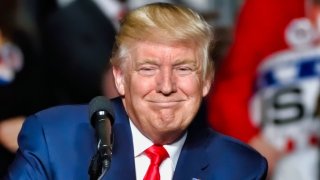Donald Trump’s Conviction Is His Rosebud Moment
It’s never been about democracy. It’s always been about the rule of law. Now that Donald Trump is a convicted felon, he’s making the American judicial system the centerpiece of his presidential run. After a lifetime of flouting the law, Trump is seeking a mandate based on revenge and retribution to raze the institutions of the federal government.
It’s never been about democracy. It’s always been about the rule of law. Now that Donald Trump is a convicted felon, he’s making the American judicial system the centerpiece of his presidential run. After a lifetime of flouting the law, Trump is seeking a mandate based on revenge and retribution to raze the institutions of the federal government.
Contrary to his protestations, the judicial system is not rigged. He was not subjected to a witch-hunt. President Joe Biden did not order the Justice Department to target Trump.
If anything, Trump is receiving favorable treatment. The Supreme Court appears to be on the verge of granting him some kind of presidential immunity. His January 6 case in Washington is stuck in limbo as Florida Justice Aileen Cannon drags out the national security documents case against him.
Yet Trump is successfully mobilizing the Republican party to join him in his decades-long crusade against the justice system. Whether they are vying to become Trump’s vice-president (Tim Scott) or simply interested in retaining their purchase on power (House Speaker Mike Johnson), a praetorian guard of Republicans has mobilized to depict Trump as a victim of a rogue prosecutor. Sen. Tommy Tuberville denounced the jurors for being “the supposedly American citizens in that courtroom.”
The die-hards are those in the conservative camp who continue to oppose Trump. Former national security adviser John Bolton declared, “Today’s verdict is a fire-bell in the night. The Republican Party now has one last chance to change course, and not nominate a convicted felon for President.” Former Maryland Governor Larry Hogan, who is running for Senate, issued a muted statement indicating that Americans should respect the results of the jury trial—a statement that quickly earned him a rebuke from Trump senior campaign adviser Chris LaCivita: “You just ended your campaign.” Meanwhile, the College Republicans tried to have it both ways: “Today's convictions are the result of a politically motivated prosecution, but a verdict was handed down by jurors whose decisions were made in accordance with our criminal justice system. As such, the outcome of this trial should be respected.” Mollie Z. Hemingway responded, “Completely discrediting. Show trials not only shouldn’t be respected, they should be condemned.”
But if Republicans make the trials of Trump the focal point of the 2024 campaign, it’s hard to see how that becomes a winning message that appeals to swing voters, or anyone who isn’t already singing from the Trump hymnal. Inflation, the border, upheaval abroad—those are the themes that have seem to have bolstered the GOP in recent years. To personalize the election—to make it all about Trump—follows the themes that Biden has already been enunciating. It heightens the perception that Trump, far from being a stable steward of America’s fortunes, is an impetuous would-be authoritarian. It will also draw more attention to Trump’s record as a career criminal who has sashayed from one financial fiasco to the next—four bankruptcies in total. Trump believes, or professes to believe, that he can perform the political equivalent of alchemy—transmuting his conviction as a felon into electoral gold.
But the fact that the conviction occurred in Manhattan, where he first sought fortune and fame, has to come as a terrible psychic blow. Manhattan was his greatest mistress. Now he has been repudiated by it.
Trump will rage and curse and shout. But this is his Rosebud moment. The trial may well be the end of the beginning for his 2024 campaign. The trial didn’t give Trump a bum rap. It gave him a rap sheet. For Biden it offers a golden opportunity to reframe the race, not around his own record, but Trump’s.
About the Author: Jacob Heilbrunn
Jacob Heilbrunn is editor of The National Interest and is a nonresident senior fellow at the Atlantic Council’s Eurasia Center. He has written on both foreign and domestic issues for numerous publications, including The New York Times, The Washington Post, The Wall Street Journal, Financial Times, Foreign Affairs, Reuters, Washington Monthly, and The Weekly Standard. He has also written for German publications such as Cicero, Frankfurter Allgemeine Zeitung, and Der Tagesspiegel. In 2008, his book They Knew They Were Right: the Rise of the Neocons was published by Doubleday. It was named one of the one hundred notable books of the year by The New York Times. He is the author of America Last: The Right’s Century-Long Romance with Foreign Dictators.
Image Credit: Creative Commons.


